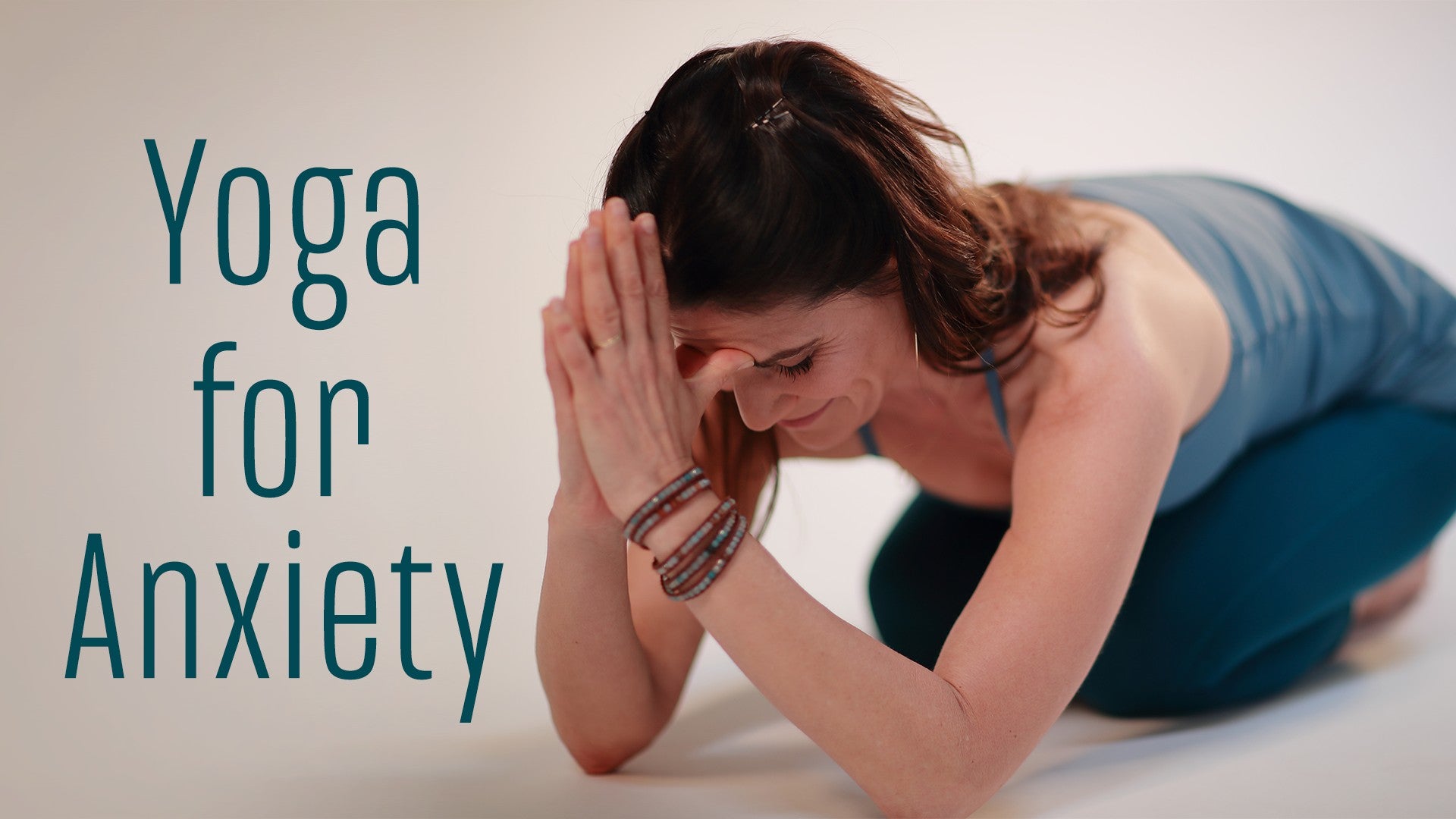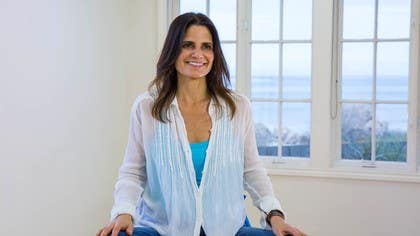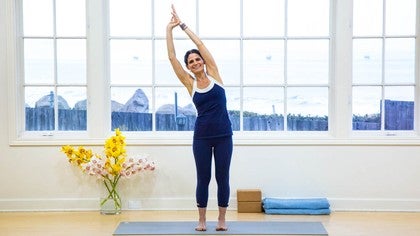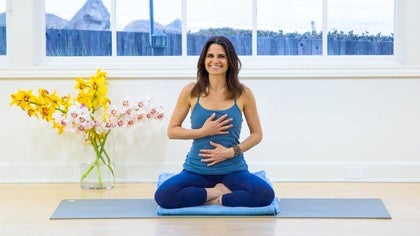Description
About This Video
Transcript
Read Full Transcript
So what anxiety feels like to me is a very bodily experience. It can feel like quivering and shaking, it can feel a little bit like nausea and a feeling of sort of just not being insulated and held. The first time I really had a panic attack, which is a full-blown anxiety experience, it felt very much like a true heart attack. It felt like shaking, dizziness, sweating, really a lot of vibrating in my body that felt very unnerving. That doesn't feel like the day-to-day anxiety that we walk around with.
That was a very acute experience. But even low-lying anxiety has a flavor of those symptoms of shakiness, an inability to control really how we feel in the body, and definitely a feeling of not being supported, not being grounded, not being able to breathe really easily, feeling very constricted. So the relationship between the breath and anxiety is one of the most important things that we can pause to consider because when we're in the stress response, our breath is very short and shallow, very fast and rapid. And that is not only caused by feeling fear, but that short, shallow breathing actually helps us when we really are in danger to fight or flee to supply us with more oxygen. So there's like this loop between us being afraid and then our breath getting the message to speed up to give us more oxygen.
And then we become habitual about breathing in this short, shallow pattern. And when we're tense and we're busy, our body minimizes the ability for our diaphragm to move full. It minimizes it through restrictions like tension and tight muscles or posture. And so the less we breathe deeply, the more we tell our nervous system to respond with fight, flight, or freeze. So it's this loop, we're afraid so our breath goes more shallow, our breath goes more shallow and rigid, and therefore we become more afraid.
And to interrupt that loop that is really more regular for many people than we will think, we're so used to breathing minimally that we forget what it feels like to have a deep full breath. When we can create conditions where there can be a fuller, deeper, slower breath, that is what interrupts the stress response. As we breathe deeply and fully, not only does that move our diaphragm more fully, which stimulates what's called the vagal nerve. And the vagal nerve is the, it's like the light switch from on to off. And the deep, rhythmic breathing is the switch that stimulates the vagal nerve to send a message from the gut all the way up to the brain, hey, we're okay right now.
We don't need the resources to fight our flight. We can begin to turn that off and we can reinstate our body's healing, self-corrective systems. So the relationship between the breath and anxiety is probably the most intimate relationship that we need to consider. If we can learn how to slow it down, breathe deeply and fully, we can learn how to modulate our nervous system on purpose where we used to not have so much control. The difference between feeling anxious and having a panic attack.
I might begin by saying we all have some level of low lying anxiety. Just being human is very easy to slide into worry to fear towards rewinding and fast-forwarding that leads to this feeling of something's not going to be okay, even as a background thought. And so there's this low lying anxiety that many of us carry around all day long just waiting to be triggered and move into that sort of habitual stress response. And then there's that medium anxiety that some of us walk around with that we always are waiting for what's going to explode, what's going to jump out, what's going to go wrong. And it sort of keeps us on edge and keeps us in habit mode.
We react more than we respond. We are not able to come from a mindful place. We are just keeping up making sure everything's okay. And that is more common than I think most of us like to think about how epidemic just that level of anxiety is. A panic attack is still yet a whole other thing.
And a panic attack for me in my experience was it was debilitating. And by debilitating I mean was not able to interact with the environment around me. It felt like if somebody could do a psychedelic movie with all sorts of swirling colors and paintings and tunnel vision and feeling like the sound changes in this movie, like wah-wah-wah-wah. So your sight feels like you don't have a wide view at all. You're hearing.
You can't have this like soundscape. Everything closes in, everything feels very vulnerable. You're not really even thinking and analyzing in a panic attack actually. You are in full experience mode and it's shaky. It's horrifying.
You don't know what's going to happen to you. I think that's one of the things about a panic attack is you feel so out of control that you fear for your true safety, not knowing when is this going to end, how is this going to end, and will I be okay. I think if you are somebody who gets panic attacks and some regularity or frequency, you do develop tools, you learn the impulse, you know when it's going to arise and therefore you can equip yourself with a few key tools, which has been my mission, is that you can learn how to ground yourself. You can learn how to breathe deeply and use that when you feel a panic attack arising. Our thoughts, we're learning how to relax with what's actually happening in our mind.
So the thing is, if someone's having a panic attack and even if someone's really anxious, you can't just say, relax, I mean, relax. It's just not going to happen. So the game is I need real bonafide tools to let my body know it's safe. If my body knows it's safe, if I know that there's ground holding me up, then I can deepen my breath. If I can deepen my breath, I can tell my nervous system to calm down with a calmer body and a quieter nervous system, then I can look at what's really happening in my mind.
It doesn't mean I'm not going to be afraid. It doesn't mean I'm not going to think scary thoughts or be worried about what I'm experiencing. It just means I won't be reacting to those thoughts in the same way that pushes me towards that panic or anxiety. Being relaxed and healthy doesn't mean all the thoughts that are going to go through our head are going to be thoughts that have the quality of joy or bliss or happiness. We're learning how to relax with whatever goes through our mind, the full range of possibilities.
That's the resilience we need to be in the human experience. So my number one go-to tool, tool number one is what's under my body. As soon as I start to feel anxious, afraid, shaky, what's under me? Am I on a chair? Am I standing on the ground?
And to literally bring my awareness all the way down and recognize I'm supported. There's something solid here that's going to hold me up. Step number two is taking a deep breath, ground or land, and then allow for a deep breath on purpose. Kind of put your oxygen mask on then. So I take a very expansive inhale and let the exhale all the way out and then stay with my breath.
I just keep staying with my breath over and over again until I feel calm enough to really acknowledge, okay, I am safe, I'm not comfortable, I kind of wish this wasn't going on, but I'm safe. I'm on my body, I'm with my breath, I can now see what's really happening and I can decide is it real because I think it's happening or is it true? There's a difference between real and true. So for instance, it's shown that we can actually have a stress response from feeling insulted. We can have a stress response from feeling unloved.
We can have a stress response from feeling left out, not just fearing for our life or our circumstances, but how we feel met by other people can give us that same fight or flight response as when we're really running from danger. So when I say real or not true, it could be literally like, is that a real snake or is that a garden hose? It's true in my mind that I believe it's a real snake, but it's not actually a real snake. So I'm having the experience that it's a snake when it's not. So you learn when you ground and you breathe deeply, you begin to differentiate between what's real and true.
Oh, that's not a snake, that's a garden hose I can calm down. Well the same way with interpersonal relationships, it's really no different. We can have this feeling that they don't like me. We can have this feeling that they're ignoring me. We can have this feeling that I'm not good enough.
Whatever that feeling might be, it might be real to us. This is my experience of it, but it might have nothing to do with how they really feel about us. And so whether it's the stress response in an interpersonal situation or the stress response out there in real life, we can begin to feel grounded, breathe deep, and then work with, okay, what's really happening here now and how can I respond in a way that's going to keep my nervous system not only calm, but also be a more mindful and nourishing choice. I don't know how the sages felt about anxiety. What I have learned that I imagine the sages would share is that all of our life experience holds a tremendous amount of wisdom and gifts.
And even in my own experience with anxiety, what became really important for me is anxiety helped me learn what I was holding onto in my body. Anxiety helped me learn what was hidden, what I haven't dealt with. Here asks me to look at how am I participating in this? What is my reaction? What is the life experience that I have carried to this point that is responding to these circumstances?
And therefore, when I experience anxiety, the gift of it, it's asking me to pause and look very deeply and very closely on how I am in relationship with my circumstances right now and with the history of who I am and how that's coming together. And I'm pretty sure that some level of that wisdom would be shared with me through the sages is that life offers us the lens through which we need to see things in order to learn and to expand and to become more and more comfortable with our wholeness. And to be comfortable with our wholeness, we need to really look at the ways we resist our wholeness. And for me, anxiety has shown me how do I resist my own wholeness? When we're anxious all the time, we're exhausted.
It uses resources. It depletes us. It's uncomfortable. It's not only uncomfortable mentally and emotionally, but it's uncomfortable physically holding tension. Tension and anxiety are inseparable.
And over time, it is far more debilitating to hold tension in our bodies than it is to look at the root causes of it and to practice releasing it. Working with anxiety and finding relief for it, I would say number one would be bodily relief, releasing the held tension, relating and allowing the ground to hold us in a way we're not used to, allowing deep breath to soften our muscles, to literally massage us inside, to put our actual physical experience, tissue and muscle and fascia at ease. And I would say that is the best place to start because when we experience a little bit more comfort, not only do we then start breathing more deeply and more consistently more often, but then we can work with our thoughts and our feelings and we can begin to observe our thoughts and our feelings and start to see what's habitual and how is my anxiety triggered by my own habits of thinking and how we can begin to become an observer and how we can create kind space for our crazy thoughts, how we can become an observer of our habit that tends to put us back in the loop. So those quick, the quick opposite, relaxing the body, deepening the breath and creating an environment where we can see our mental habits is really most important. Does it mean we're not going to be afraid?
No. Does it mean we're not going to be sad? No. Will we have thoughts that we have to look at and deal with? Probably.
But we'll have the resources to do so and the mind will naturally get more quiet when the body is more calm and the breath is more deep. One thing I feel is really important to discuss about when we practice yoga and when working with anxiety is that since we're always rushing and going and busy all the time, we gravitate towards practices that ask us to stay engaged and to keep doing. And a lot of times when we have anxiety, we jump into practices that keep us going and moving at the pace that propagates that feeling of short breath and high activity. We benefit from slowing down and from grounding, but that's really difficult when you're anxious. To be asked to slow down when you're on 100 miles an hour can be alarming in and of itself.
To do resting poses and restorative poses and to not have so much stimulus to engage in when we take away some stimulus, for someone who feels a little anxious, that's not comfortable. And yet, it is the antidote. The antidote is being able to slow down and get grounded and create a deeper rhythmic breath, but how we do that is really important. So the practices that I have created and offered here, they will bring us down in pace. But there's lots of activity to stay engaged in, whether it's movement or breath or in the relaxations I guide the whole time to stay present with you, to stay engaged, or add some movements and restorative poses so that the longer pockets of complete stillness are not going to create even more anxiety.
I think that that is an important piece of remembering to do this practice. The other most important piece when it comes to using yoga therapeutically to help us manage anxiety is we need tools to manage this off our mats and off our cushions. What matters is, is this yoga supporting our life? And so what I'm most excited for in this show happened to be the one-minute practices. Because we offer four different one-minute tools, and those tools are there for you to use all day long on purpose so that when you're in the thick of it, when your nervous system is about to rev up, you remember, I got this, I'm going to ground, I'm going to breathe.
And that you can bring a new way of being in that old situation where you used to feel triggered, you can now calm yourself in a way you were not able to before.
Yoga for Anxiety
Comments
You need to be a subscriber to post a comment.
Please Log In or Create an Account to start your free trial.









